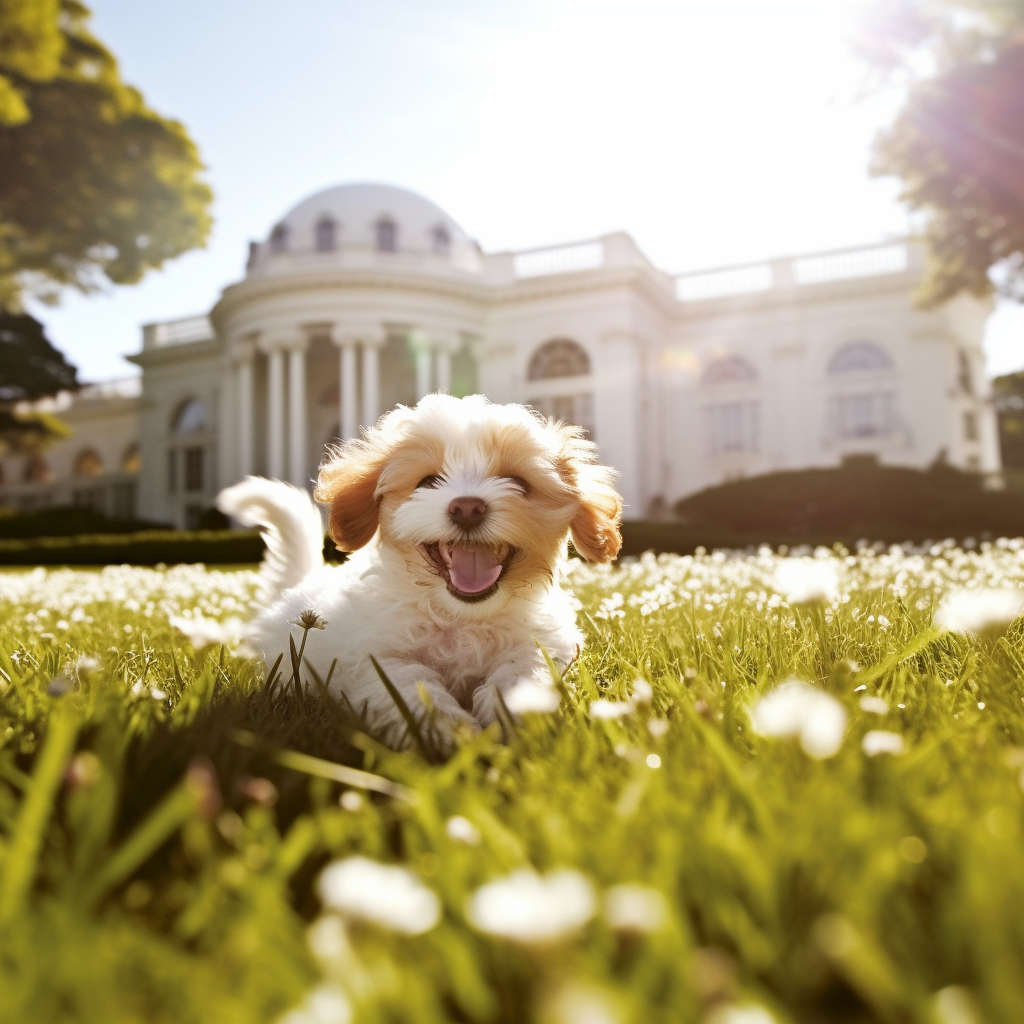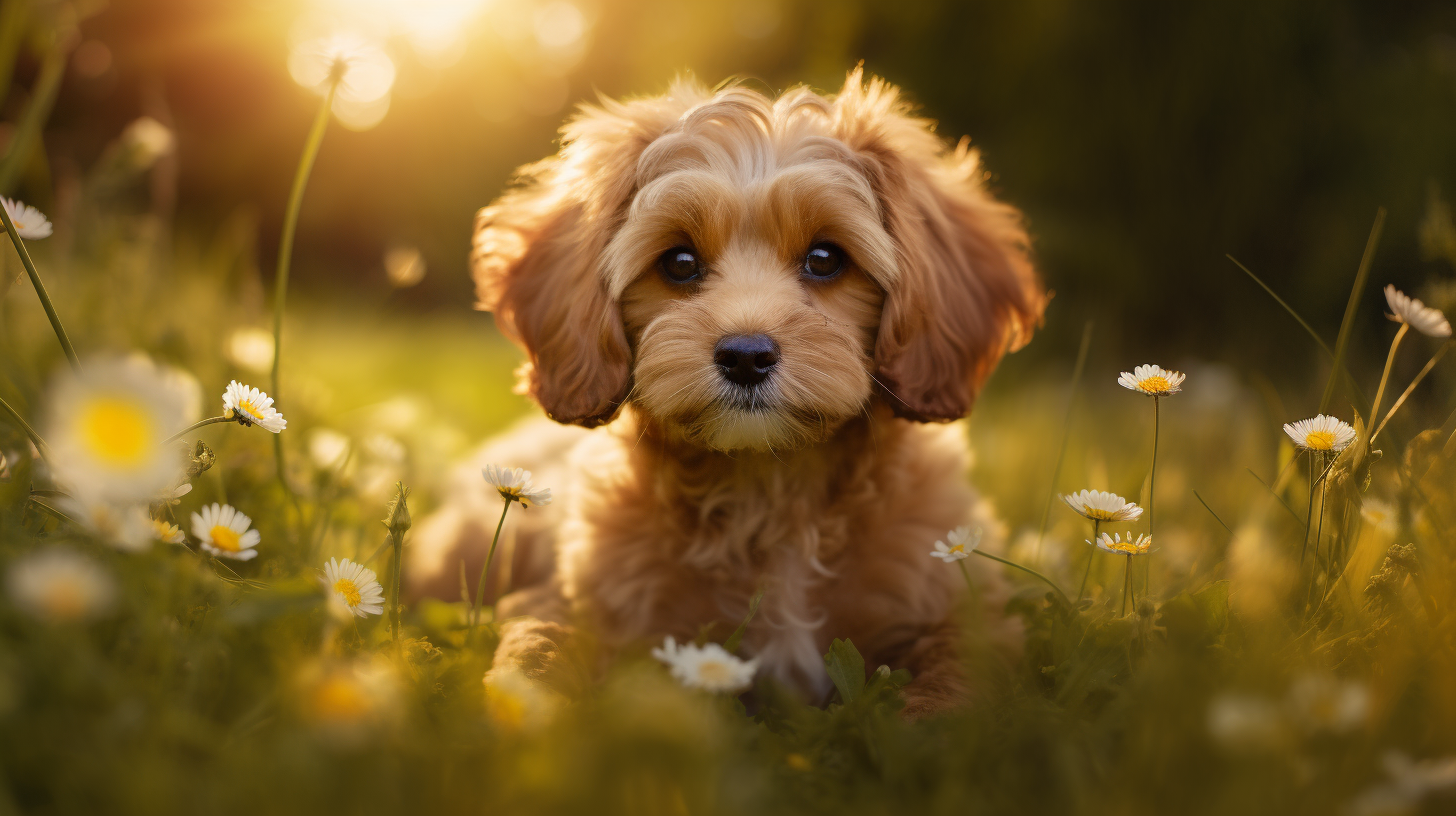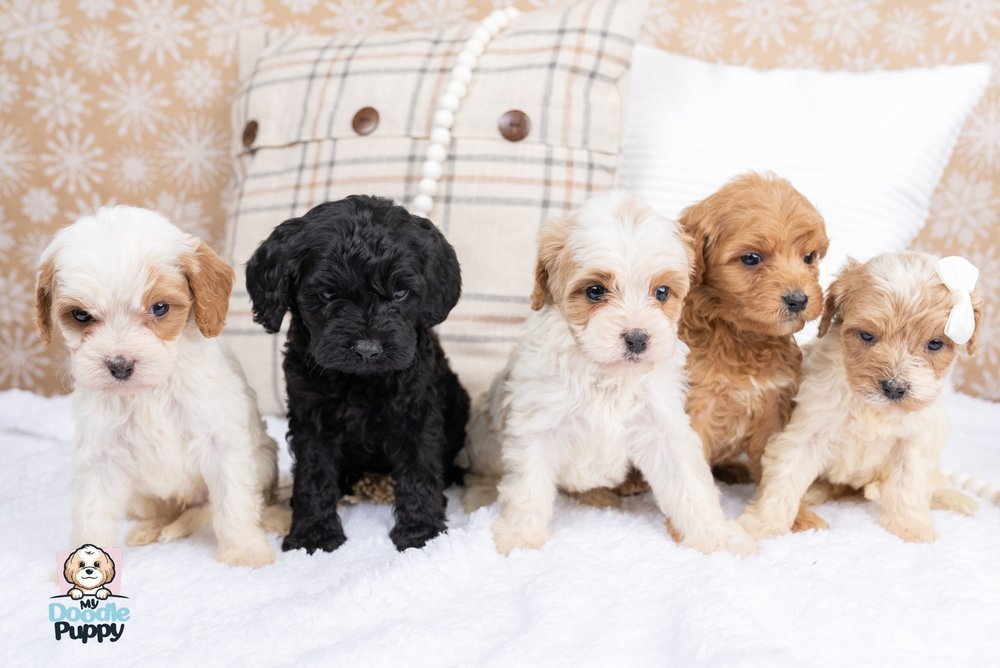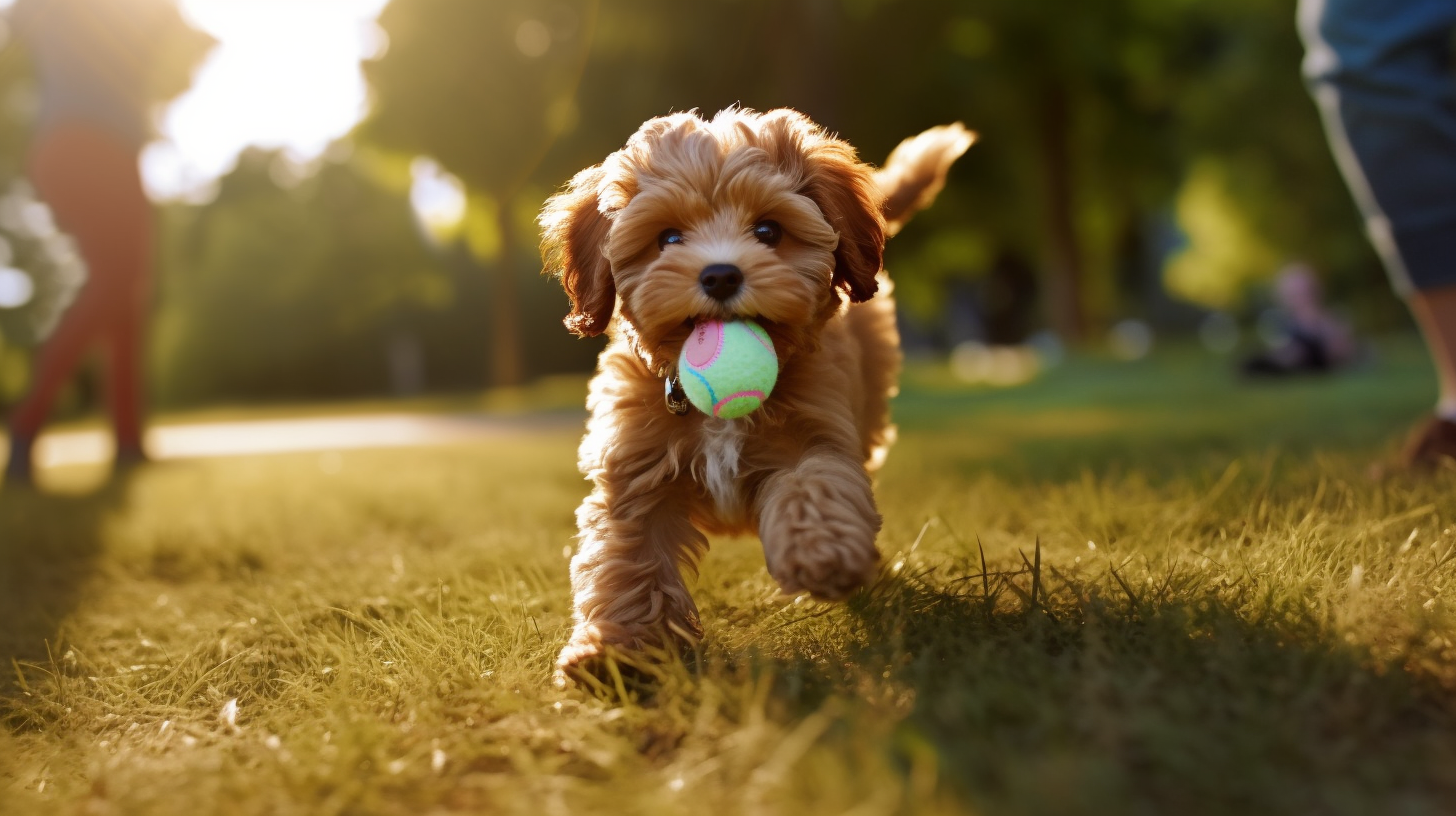Cavapoo Behavior and Temperament: What to Expect
Understanding a Cavapoo's behavior and temperament is an essential step toward becoming a successful Cavapoo parent. Their behavior can be a beautiful blend of their genetic heritage and their upbringing, creating a unique personality that is both charming and, at times, challenging. It's important to remember that each Cavapoo is an individual, and while we can predict certain traits based on their breed, each will have their own personality quirks and characteristics.
In this comprehensive guide, we will delve deep into the world of Cavapoos, exploring their behavior, temperament, and the factors that influence them. We'll discuss the best of their traits, some potential challenges, and provide actionable advice on how to nurture and train a Cavapoo.
Whether you're a prospective Cavapoo owner, a new parent to a Cavapoo puppy, or a long-time lover of the breed looking for some extra insights, this guide is for you. So let's dive in and get to know the captivating Cavapoo a little better.
What is the Cavapoo Temperament Like?
Cavapoo temperament is significantly influenced by its genetic makeup, inherited from the parent breeds - the Cavalier King Charles Spaniel and the Poodle. Understanding the temperaments of these parent breeds is essential in dissecting the behavior of a Cavapoo.
Cavalier King Charles Spaniels are known for their gentle and affectionate nature. They are friendly, eager to please, and thrive on companionship, making them excellent family pets. Their sweet temperament often shines through in the Cavapoo, making them similarly warm and affectionate.
Poodles, recognized for their intelligence and vivacity, bring a dynamic energetic element to the Cavapoo mix. Poodles are highly trainable and alert, which contributes to the Cavapoo's clever and adaptable demeanor.
The unique blend of these traits gives the Cavapoo its distinct temperament. A Cavapoo, therefore, tends to be friendly, affectionate, and intelligent, embodying the best of both parent breeds. However, it's important to remember that while genetics play a significant role in defining a Cavapoo's behavior, other factors like upbringing and environment also have a considerable impact. The combination of these influences makes each Cavapoo a unique individual, regardless of their shared genetic traits.
The temperament of the Cavapoo can vary depending on the traits inherited from its parent breeds, but in general, they are known for being:
Sociability: Cavapoos are known for their sociable and friendly disposition. They're typically great with all members of the family, from children to seniors, and even other pets. Their non-aggressive nature and openness towards guests make them wonderful household companions.
Loving Nature: Owing to their Cavalier King Charles Spaniel lineage, Cavapoos are highly affectionate dogs. They have a great love for cuddling and never miss an opportunity to express their affection to their human family.
Intellect: Cavapoos take after their Poodle parent in terms of intelligence, making them fast learners. This intellectual curiosity also means they appreciate mental challenges offered by interactive toys and puzzle games.
Flexibility: Known for their adaptability, Cavapoos can comfortably adjust to varying living conditions, be it a bustling city apartment or a quiet countryside home, given they receive ample exercise and mental engagement.
Desire to Please: Cavapoos generally possess a pleasing personality, which can turn training into a fun-filled activity. Their positive response to reward-based training methods aids in shaping their behavior.
Balanced Energy Levels: Cavapoos, while enjoying playful sessions and walks, aren't as high-energy as certain other breeds. They can sync their activity level to their family's lifestyle, making them ideal companions for both active and more laid-back individuals.
Cavapoos tend to have a happy and cheerful disposition, making them a joy to be around. They are eager to please their owners, and are often described as being loyal and loving. Due to the long Cavapoo lifespan they will be loving and loyal members of the family for many years.
How Do I Know if My Cavapoo is Happy?
Determining if your Cavapoo is content involves observing their behavior and body language. Here's how you can tell:
Tail Wagging: A raised and wagging tail is a clear sign of a happy Cavapoo.
Relaxed Ears: When your Cavapoo's ears are relaxed and not pinned back or stiff, it's an indication they are content and at ease.
Relaxed Body: A happy Cavapoo will have a relaxed body posture, indicating they are comfortable in their surroundings.
Playful Behavior: A Cavapoo showing interest in play and being active is typically a sign of happiness.
Physical Affection: If your Cavapoo leans into you or seeks your touch, it's a good sign they are content and feel safe with you.
Typical Cavapoo Temperament Traits
Cavapoos are adored for their distinctive temperament traits inherited from their parent breeds. These include:
Affectionate: Known for their loving nature, Cavapoos form strong bonds with their human families and make excellent companions.
Intelligent: With their Poodle lineage, Cavapoos are often quick learners, making training generally straightforward.
Playful: These dogs are active and enjoy various activities, making them adaptable to different forms of exercise and play.
Social: Cavapoos are friendly and generally get along well with other pets and humans, making them a great fit for families.
Adaptable: They adjust well to different environments, be it a city apartment or a country house.
Negative Traits of a Cavapoo
Cavapoos are largely endearing, but there are a few potential negatives:
Separation Anxiety: Cavapoos can become anxious if left alone for long periods, leading to behaviors like excessive barking or destructive chewing.
Grooming Requirements: Cavapoos need regular grooming due to their curly, hypoallergenic coats, which means regular brushing and professional grooming to keep their coats in top condition.
Potential for Excessive Barking: While great as alert dogs, some Cavapoos may bark excessively if not properly trained. Cavapoos, generally speaking, aren't excessively barky dogs. However, individual temperament and the degree of socialization can affect their barking tendencies. While some Cavapoos might be more vocal, others might be quieter. Proper training and early socialization can help manage potential excessive barking.
High Energy: Their playful nature requires regular exercise; otherwise, they might resort to destructive behaviors.
Stubbornness: Cavapoos may occasionally show stubborn behavior if not properly trained. Consistent, positive reinforcement methods work best.
Health Issues: Cavapoos, like all breeds, are prone to certain health conditions like hip dysplasia and mitral valve disease.
Noise Sensitivity: Some Cavapoos may be sensitive to loud noises, causing fear or anxiety.
Need for Mental and Physical Stimulation: Cavapoos are intelligent and active. They can become bored and destructive without sufficient mental and physical stimulation.
Do Cavapoos Have Behavioral Issues?
Most dog in general have a few behavioral problems including the Cavapoos. While generally displaying good temperament, may present certain behavioral challenges. These could include excessive barking, persistent digging, and habitual chewing, among others. Such behaviors are not unique to the breed and can be effectively managed with proper training, exercise, and mental stimulation. Remember, each dog is an individual, and occasional behavioral issues do not overshadow the overall delightful nature of Cavapoos. These problems aren’t out of the ordinary because most dogs have them at one point.
At What Age Does a Cavapoo Calm Down?
Cavapoos typically start to show signs of calming down between the ages of 18 to 24 months. However, it's essential to remember that each Cavapoo is individual and this timeline can vary. Some may show signs of calming down earlier or later than this timeframe.
What Can Have an Impact on the Cavapoo Temperament
While the Cavapoo is generally known for its friendly and affectionate personality, it is important to note that like all dogs, the personality of a Cavapoo can be influenced by factors such as:
Genetics
Environment
Socialization
Training
Providing your Cavapoo with proper socialization, training, and the right amount of exercise from an early age can help to shape their personality and ensure that they grow up to be well-behaved and confident dogs.
The environment in which a Cavapoo is raised significantly influences its behavior and temperament, alongside its genetic disposition. It's crucial to remember that while genetics can lay a foundation, the environment further shapes and molds these behaviors.
If a Cavapoo is brought up in an unloving home or a shelter, it may lead to certain behavioral issues. Lack of proper care and socialization or exposure to trauma and stress can make a Cavapoo more anxious or fearful. They may exhibit signs of aggression, excessive barking, or destructive behavior. Furthermore, they may also struggle with attachment and trust issues, making it difficult for them to bond with their human family.
The importance of a nurturing and caring environment for a Cavapoo's overall behavioral health cannot be overstated. A positive environment, filled with love, patience, and consistent training, can mitigate any inherent tendencies toward behavioral problems. Regular socialization with both humans and other dogs will contribute to a Cavapoo's confidence and overall social behavior. A well-nurtured Cavapoo, in a loving home, is likely to be happy, confident, and well-adjusted.
Thus, while a Cavapoo's genetics may predispose them to certain traits, their environment and upbringing have a substantial impact on shaping their behavior and ensuring their emotional health.
Promoting Good Behavior in Your Cavapoo
Training and nurturing good behavior in your Cavapoo can enhance the bond between you and your pet. Here are some tips:
Positive Reinforcement: Reward the behavior you want to encourage with treats, praise, or playtime, making your Cavapoo more likely to repeat the behavior.
Consistency: Ensure all members of your household follow the same rules and commands to avoid confusing your Cavapoo.
Patience and Understanding: Training takes time. Be patient and understanding, providing gentle guidance during training sessions.
Early socialization is vital for raising a well-adjusted Cavapoo. Exposure to different people, animals, and environments in a controlled manner can aid in their growth into a friendly and confident adult. Training a Cavapoo requires patience, consistency, and plenty of positive reinforcement, leading to a well-behaved and joyful addition to your family.
How Do You Discipline a Cavapoo?
Disciplining a Cavapoo effectively involves a balance of firmness, consistency, and positive reinforcement. Here's how:
Use Positive Reinforcement: Reward your Cavapoo for good behavior with treats, praise, or playtime. This encourages them to repeat the desirable actions.
Ignore Unwanted Behavior: If your Cavapoo engages in undesired behavior like barking excessively or chewing on furniture, try ignoring them until they stop. This teaches them that such actions won't earn them attention.
Use Firm, Consistent Commands: If your Cavapoo does something inappropriate, respond with a clear and firm "No" or "Stop". Avoid yelling or showing anger as it may confuse or frighten them.
Socialize Your Cavapoo: Regular interaction with other dogs and humans helps your Cavapoo understand acceptable behaviors.
Consider Professional Training: If you find disciplining your Cavapoo challenging, consider enrolling them in obedience classes. Professional trainers can offer useful techniques and advice.
Remember, patience is key. Each Cavapoo is unique, and what works for one might not work for another. Always approach discipline with love and understanding.
Guiding Your Cavapoo's Training
Training your Cavapoo goes beyond teaching them basic commands—it's about nurturing a strong relationship with your pet. Given their inherent intelligence and pleasing nature, Cavapoos are generally responsive to training. With the right tactics, you can assist your Cavapoo in becoming a well-mannered and sociable companion.
Consider the following essential tips when training your Cavapoo:
Begin Early: The sooner you initiate your Cavapoo's training, the better. Puppies are like absorbent pads, soaking in knowledge about their surroundings. Initiate with simple commands like "sit," "stay," and "come" and gradually introduce more intricate commands as they mature.
Socialization: Socialization is an indispensable aspect of training. Expose your Cavapoo to diverse people, animals, and environments to boost their confidence and comfort in varying situations. This can mitigate fear and anxiety in the future.
Positive Reinforcement: Cavapoos react favorably to positive reinforcement techniques. This involves rewarding commendable behavior with treats, praise, or playtime. This not only motivates them to replicate the behavior but also ensures that training is a pleasurable experience for them.
Emphasis on Consistency: Consistency in command terms, rewards, and expectations is crucial when training any dog, including Cavapoos. Ensure that all family members maintain the same approach to avoid confusing your pet.
Patience: Keep in mind, training is a process that requires time and patience. Don't anticipate instant results. Celebrate small successes and ensure that the training sessions remain fun and engaging for your Cavapoo.
Professional Assistance: If you're facing challenges with certain behavioral problems, don't hesitate to consult a professional. A professional dog trainer or behaviorist can offer guidance and strategies customized to your Cavapoo's specific requirements.
Training is a continuous process and an essential aspect of conscientious dog ownership. It requires an investment of time and effort, but the result—a well-behaved, joyful, and self-assured Cavapoo—is, long lasting Cavapoo absolutely worth it. Remember to make it an enjoyable and rewarding experience for your Cavapoo, and in the process, you'll fortify your bond and relish a remarkable companionship.
Frequently Asked Questions About Cavapoo Temperament
What behavior problems do Cavapoos have?
Cavapoos are generally well-behaved and well-mannered dogs. However, like all dogs, they can exhibit some behavior problems from time to time. Some common behavior problems in Cavapoos include excessive barking, digging, and chewing. Learn more about the pros and cons of a Cavapoo puppy.
These problems can usually be resolved with proper training, socialization, and exercise. If you are concerned about any behavior problems in your Cavapoo, it is best to consult with a professional dog trainer or veterinarian for guidance. You can also avoid these issues by getting a fully trained Cavapoo puppy.
Do Cavapoos bark a lot?
Cavapoos can bark, but they are not known for being excessive barkers. In general, Cavapoos are well-behaved and quiet dogs, making them suitable for apartment living and other environments where noise is a concern.
However, if your Cavapoo is barking excessively, it is usually a sign that they are trying to communicate something to you. This could be a sign of boredom, anxiety, or an underlying health issue, so it is important to take them to a veterinarian for a check-up.
Is a Cavapoo a calm dog?
Cavapoos are generally considered to be calm and well-behaved dogs. They tend to have a relaxed and laid-back personality, making them ideal for families with children or individuals looking for a companion to relax with. Cavapoos are also good at adapting to different environments and routines, making them a suitable pet for individuals with busy lifestyles.
Are Cavapoos destructive?
Cavapoos are not known for being destructive dogs.
However, like all dogs, they may engage in destructive behavior if they are bored, anxious, or lacking proper exercise. Providing your Cavapoo with plenty of mental and physical stimulation, as well as plenty of toys and chew bones, can help to prevent destructive behavior.
Are Cavapoos high maintenance?
Cavapoos are generally considered to be low-maintenance dogs. They are intelligent and easy to train, and do not require a lot of grooming because of their hypoallergenic coat. Cavapoos are also relatively small in size, making them easy to take care of and ideal for apartment living or smaller homes. Regular exercise, proper nutrition, and routine vet check-ups are important for maintaining your Cavapoo's health and well-being, but overall, they are a low-maintenance breed.
Conclusion
Embarking on the path of becoming a Cavapoo parent is a thrilling and fulfilling experience. These endearing and smart dogs have much to provide, from their sociable and loving demeanor to their versatile and cooperative nature.
Recognizing their behavior, acknowledging the impact of both genetic and environmental elements, and being ready for the responsibility of training and caring for them are the foundations of a successful bond with your Cavapoo. Keep in mind that each Cavapoo is distinct, possessing their own personality and peculiarities that make them the pet you'll grow to adore and treasure.
While they may present a few challenges, the happiness and companionship they contribute to your life far exceed any obstacles. Their charming characteristics and the affection they so readily offer make them an exceptional selection for families, single individuals, and seniors alike.
Ultimately, offering a loving, nurturing, and engaging environment for your Cavapoo will allow them to flourish and develop into the finest dog companion they can be. In return, they'll reward you with ceaseless love, amusement, and steadfast companionship.
As you venture into the world of Cavapoos, we wish you a journey brimming with unforgettable experiences, unconditional affection, and a relationship that only a Cavapoo can provide. Welcome to the Cavapoo community!





